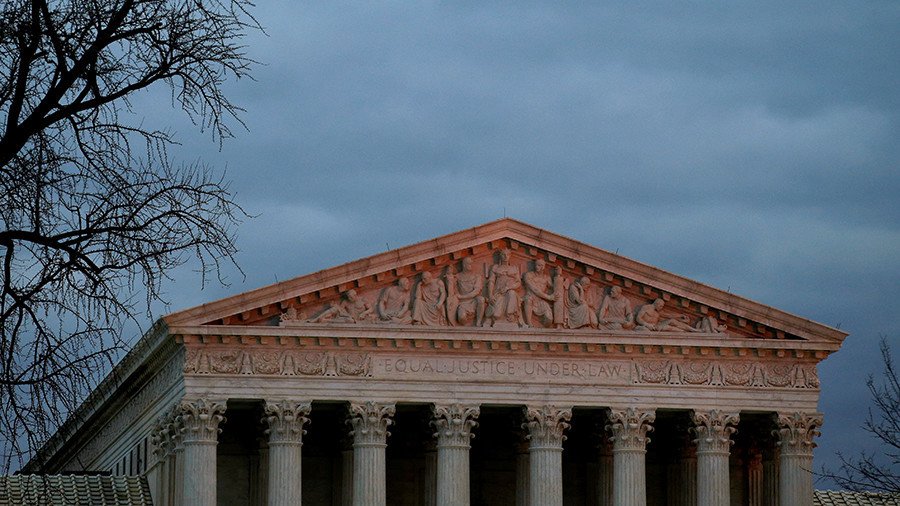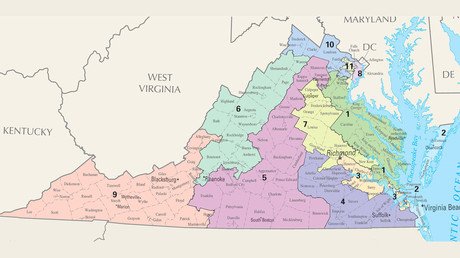Pennsylvania court rules state’s gerrymandered congressional map unconstitutional

The Pennsylvania Supreme Court threw out the state’s congressional map and ordered lawmakers to redraw new, nonpartisan districts. If the Democratic governor doesn’t approve, the court may undertake the task.
On Monday, five out of the seven justices on the Pennsylvania Supreme Court ruled the state’s congressional map “clearly, plainly and palpably violates the Constitution of the Commonwealth of Pennsylvania.”
Lawmakers are enjoined from using the current congressional map during the 2018 primary. However, the 2011 map will still be used for the March 13 special election in Pennsylvania’s 18th district. The seat will be vacated by Rep. Tim Murphy (R), an anti-abortion lawmaker who stepped down after allegations that he pressured his lover to get an abortion.
The order issued by the Supreme Court today found that the current congressional map violates Pennsylvania’s constitution. We thank all parties who brought this before the Supreme Court and helped right this obvious wrong. pic.twitter.com/P1TStRdJ6t
— PA Democrats (@PADems) January 22, 2018
The court ordered the Pennsylvania General Assembly to submit a new congressional district plan to Governor Tom Wolf (D) for approval by February 9.
Wolf released a statement after the ruling, calling the congressional map “unfair.”
“I strongly believe that gerrymandering is wrong and consistently have stated that the current maps are unfair to Pennsylvanians,” Wolf said. “My administration is reviewing the order and we are assessing the executive branch’s next steps in this process.”
Wolf would have until February 15 to submit a new plan to the court.
In the event that the General Assembly does not submit a congressional districting plan, or if their plan is rejected by the governor, the court would “proceed expeditiously to adopt a plan based on the evidentiary record developed in the Commonwealth Court.”
The court advised both parties to submit proposals in order to have their ideas heard “in anticipation of that eventuality.”
Both parties were advised to submit plans that do not “divide any county, city, incorporated town, borough, township, or ward, except where necessary to ensure equality of population.”
Democrats said the ruling will be hard to appeal since it was made on the “sole basis” that it violated the state constitution, and the US Supreme Court can only hear federal claims in such a case.
“It’s well established that the United States Supreme Court does not review decisions in state court that exclusively construe state law, which is the exact situation you have here,” Stanton Jones, an attorney for the plaintiffs, told the Philadelphia Inquirer. “This concept of federalism, this is an important part of it. The United State Supreme Court doesn’t get to tell a state’s highest court what is state law, in this case Pennsylvania law.”
However, Senate Republicans leaders said they will request a stay from the US Supreme Court.
“Today’s ruling by the State Supreme Court is a partisan action showing a distinct lack of respect for the Constitution and the legislative process. The PA Supreme Court has overstepped its legal authority and set up an impossible deadline that will only introduce chaos in the upcoming Congressional election,” Senate President Pro Tempore Joe Scarnati (R-25) and Senate Majority Leader Jake Corman (R-34) said in a joint statement after the ruling.
Today’s ruling by the State Supreme Court is a partisan action showing a distinct lack of respect for the Constitution and the legislative process. https://t.co/S0bFXuTYYj
— Senator Joe Scarnati (@senatorscarnati) January 22, 2018
Both Republican justices issued dissentingstatements that decried the court for issuing the ruling before the US Supreme Court rules on a case about Wisconsin's redistricting plan. The Republican justices also argued that the court should not have applied the ruling so close to the 2018 midterm elections.
The ruling comes from a lawsuit brought by the League of Women Voters last year, which argued that the Congressional Redistricting Act of 2011 was “one of the most extreme partisan gerrymanders in American history.”
'Unconstitutional partisan gerrymander': Wisconsin must redraw legislative districts https://t.co/OdwLkeTkgppic.twitter.com/5GwfKpDNjD
— RT America (@RT_America) January 27, 2017
The lawsuit details how Republican mapmakers used advanced computer programs to “pack” Democrats into five out of 18 congressional districts, despite the fact that registered Democrats outnumber Republicans in the state, according to the most recent voter registration statistics from the Pennsylvania Department of State.
The League of Women Voters argued that Republicans have exacerbated partisanship when they packed Democrats into a few solid blue districts, while “cracking” their support in other areas with the oddly shaped districts.
#Gerrymandering hurts our communitiesConsider Pennsylvania’s 7th Congressional District, nicknamed “Goofy kicking Donald.” It’s regularly described as one of the most gerrymandered districts in the country. pic.twitter.com/zV0j5vGTwz
— kathleen (@baad_kittee) December 3, 2017
“When voters lose the ability to elect representatives of their party as a result of gerrymandering, those voters lose not only electoral power, but also the ability to influence legislative outcomes, because representatives pay no heed to the views and interests of voters of the opposite party once in office,” the League said.
In their lawsuit, the League of Women Voters cited a 2015 study from Pennsylvania State University that showed how, over time, members of Congress have grown increasingly partisan. The lawsuit included a visual that shows lawmakers almost never vote with members of the opposing party anymore.
Network diagrams show dramatic rise of partisanship in US House http://t.co/62z2CFsM6zpic.twitter.com/0rq3TryRMO
— Mitch Tobin (@MitchTobin) April 23, 2015















